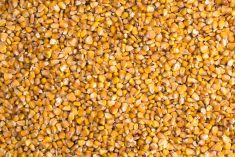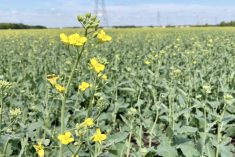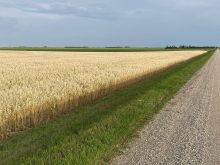Infringing on Plant Breeders’ Rights (PBR) has cost a large southern Alberta farm a record $737,597.
“The settlement relates to unauthorized advertisements and sales of PBR-protected barley and wheat varieties,” Alliance Seed, SeCan and an unnamed seed company said in a news release Wednesday.
The settlement “includes the royalties, plus legal fees and penalties,” Todd Hyra, SeCan’s business manager for Western Canada, said in an interview.
“The first thing we do in seeking these is to cover the royalties, but it’s important to note that it’s not just ‘You get caught, you pay the fee.’ That’s not fair to the system or the industry. So many times it’s a multiple of the royalties owed so there’s a penalty in there to ensure the legitimate seed sellers are not penalized by those that only pay when they get caught.”
Read Also

Alberta crop conditions improve: report
Varied precipitation and warm temperatures were generally beneficial for crop development across Alberta during the week ended July 8, according to the latest provincial crop report released July 11.
Why it matters: Farmers need to be aware of stronger PBR regulations that came into affect in 2015 under UPOV ’91, or risk paying significant penalties.
The farm, which hasn’t been identified, bought protected varieties and then chose to re-sell them as seed. It also provided custom seeding services using protected varieties.
“Both of those sort of fed into the infringement,” Hyra said.
The infringement took place over six years.
“It is critical that everyone in the value chain is aware of the rules,” Jim Bagshaw, general manager of Alliance Seed, said in the release.
Under current PBR rules, “not only the seller is liable for damages, but the customer and the processor — essentially everyone who played a part in the infringement. If a variety is protected by PBR it is protected, whether you call it common seed or if you call it by the variety name.”
That means farmers who buy seed from illegitimate sellers can face financial penalties too, Hyra said.
“It’s so important that customers know what the origin of their seed is,” he said. “If they want to buy a new variety and farm save it they want to be sure they are buying it from a legitimate seed seller otherwise they could be opening the door to multiples of loss if they bought some and saved it on their farm for several years.
“We want to get the word out about the importance of knowing the rules, understanding the rules and playing by them. And also it can get expensive. It’s no fun for anybody to go through and we want to try and avoid this by following the rules and agreements that are in place.”
PBR infringers are discovered when they advertise online.
“Occasionally infringers will be turned in by customers who had a falling out with their seller and realized the seller wasn’t selling them something they expected…” Hyra said.
This settlement is three times more than the previous record of around $240,000 set in 2005, he said.
Seed companies prosecute alleged infringers through civil law. This case was settled out of court and the parties made “a declaration there will be no additional unauthorized (seed) sales.”
The settlement was welcomed by Seeds Canada, which monitors for infringers and provides enforcement services to Canada’s seed sector.
This demonstrates the strength of collaborative investigations and the importance of enforcing prohibitions on illegitimate seed sales and inclusion custom seeding, Seeds Canada said in a news release Thursday.
“This news strengthens the role of Seeds Canada services,” Lorne Hadley, Seeds Canada’s director of intellectual property protection, said in the release. “We continue to work on behalf of our members and support their willingness to pursue special cases due to infringer or infringing use.”
— Allan Dawson is a reporter for the Manitoba Co-operator at Miami, Man.















